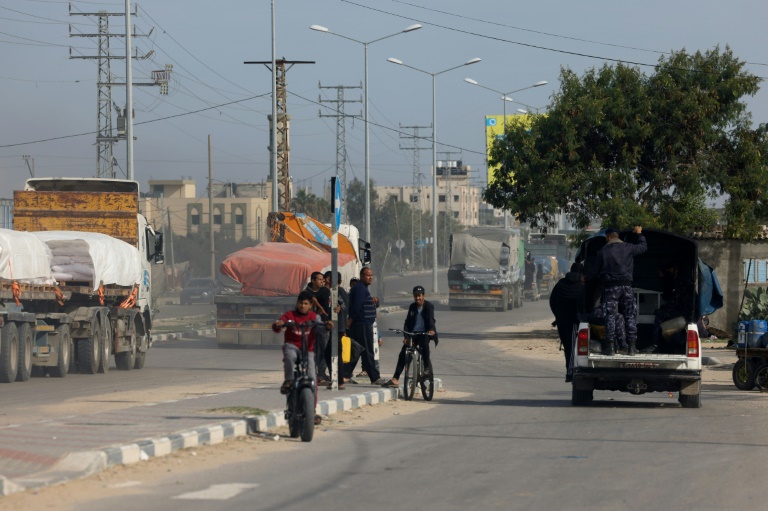UN council envoys to visit Gaza crossing as crisis spirals

Trucks carrying humanitarian aid are seen near the Rafah border crossing between Egypt and the war-torn Gaza Strip
El-Arish – UN Security Council ambassadors arrived Monday in Egypt to visit the Rafah border crossing with the besieged Gaza Strip, days after the United States vetoed a council resolution for a ceasefire.
The informal one-day trip organised by the United Arab Emirates and Egypt comes amid a spiralling humanitarian crisis in war-torn Gaza, described as a “graveyard” by United Nations Secretary-General Antonio Guterres.
Around a dozen ambassadors are taking part in the visit from countries including Russia and the United Kingdom.
But the United States, which week vetoed Friday the Security Council resolution did not send a representative as did France.
“There is no justification to turning a blind eye to the pain and suffering inflicted on the Palestinian people in Gaza,” an Egyptian foreign ministry official told the envoys during a briefing following their arrival.
Lana Nusseibeh, the UAE’s envoy to the Security Council, said member states were taking part in the trip in their “national and personal capacities”.
She said the visit aims to help them “understand not only the suffering and destruction experienced by the people of Gaza but also their hope and their strength”.
Philippe Lazzarini, the head of the UN’s Palestinian refugee agency UNRWA briefed the envoys on the harrowing humanitarian situation in Gaza before he headed to the embattled territory for his third visit since the start of the war in October between Israel and Hamas militants.
There is “deep frustration disappointment, and some outrage also that… we can’t even reach a consensus for a ceasefire”, Lazzarini said after the meeting.
“There is no real safe place in the Gaza Strip, even the UN premises currently hosting more than 1 people have been hit,” he said.
– ‘Hunger is prevailing’ –
The situation for Palestinians, Lazzarini said, is desperate.
“Hunger is prevailing in Gaza. More and more people haven’t eaten for one day, two days, three days… people lack absolutely everything.”
The diplomats are due to visit the Rafah crossing, the only gateway into the narrow enclave, as well as a hospital treating Palestinian patients in the Egyptian town of El-Arish near the Gaza border.
The war on Gaza was triggered when Palestinian Islamist group Hamas carried out the deadliest-ever attack on Israel on October 7, killing 1,200 people, according to Israeli figures, and taking about 240 hostages back to Gaza.
Israel has responded with a military offensive that has reduced much of Gaza to rubble and killed at least 17,997 people, mostly women and children, according to the Hamas-run health ministry.
The UN estimates 1.9 million of Gaza’s 2.4 million people have been displaced — roughly half of them children — by the war and Israel’s intense bombing campaign that has reduced vast areas to rubble.
The war and siege have taken a heavy toll on basic services, especially health care, with only 14 of Gaza’s 36 hospitals functioning at any capacity, according to the UN humanitarian agency OCHA, and dire shortages of food, fuel, water and medicine.
Israel had urged civilians to seek refuge in Gaza’s far south, but the army has kept striking targets throughout the territory, leading to UN warnings that there is no safe place left in Gaza.
